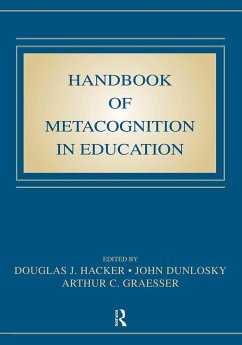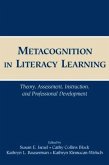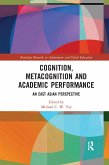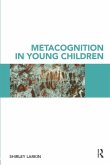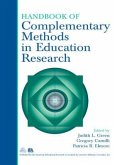John Dunlosky / Arthur C. Graesser / Douglas J. Hacker (eds.)
Handbook of Metacognition in Education
Herausgeber: Hacker, Douglas J.; Graesser, Arthur C.; Dunlosky, John
John Dunlosky / Arthur C. Graesser / Douglas J. Hacker (eds.)
Handbook of Metacognition in Education
Herausgeber: Hacker, Douglas J.; Graesser, Arthur C.; Dunlosky, John
- Broschiertes Buch
- Merkliste
- Auf die Merkliste
- Bewerten Bewerten
- Teilen
- Produkt teilen
- Produkterinnerung
- Produkterinnerung
Providing comprehensive coverage of the theoretical bases of metacognition and its applications to educational practice, this Handbook of focused and in-depth discussions from leading scholars in the field sets the standard in scholarship for theoretical research and practical usage in this field.
Andere Kunden interessierten sich auch für
![Metacognition in Literacy Learning Metacognition in Literacy Learning]() Metacognition in Literacy Learning75,99 €
Metacognition in Literacy Learning75,99 €![Cognition, Metacognition and Academic Performance Cognition, Metacognition and Academic Performance]() Cognition, Metacognition and Academic Performance65,99 €
Cognition, Metacognition and Academic Performance65,99 €![Metacognition in Young Children Metacognition in Young Children]() Shirley LarkinMetacognition in Young Children67,99 €
Shirley LarkinMetacognition in Young Children67,99 €![Theoretical Metacognition and Clinical Metacompetencies vs Contemporary Nursing: Pedagogical Transformation in Nursing Theoretical Metacognition and Clinical Metacompetencies vs Contemporary Nursing: Pedagogical Transformation in Nursing]() Walter C. MillanziTheoretical Metacognition and Clinical Metacompetencies vs Contemporary Nursing: Pedagogical Transformation in Nursing36,99 €
Walter C. MillanziTheoretical Metacognition and Clinical Metacompetencies vs Contemporary Nursing: Pedagogical Transformation in Nursing36,99 €![The Routledge International Handbook of Higher Education The Routledge International Handbook of Higher Education]() The Routledge International Handbook of Higher Education73,99 €
The Routledge International Handbook of Higher Education73,99 €![Handbook of Early Childhood Teacher Education Handbook of Early Childhood Teacher Education]() Handbook of Early Childhood Teacher Education167,99 €
Handbook of Early Childhood Teacher Education167,99 €![Handbook of Complementary Methods in Education Research Handbook of Complementary Methods in Education Research]() Handbook of Complementary Methods in Education Research188,99 €
Handbook of Complementary Methods in Education Research188,99 €-
-
-
Providing comprehensive coverage of the theoretical bases of metacognition and its applications to educational practice, this Handbook of focused and in-depth discussions from leading scholars in the field sets the standard in scholarship for theoretical research and practical usage in this field.
Hinweis: Dieser Artikel kann nur an eine deutsche Lieferadresse ausgeliefert werden.
Hinweis: Dieser Artikel kann nur an eine deutsche Lieferadresse ausgeliefert werden.
Produktdetails
- Produktdetails
- Verlag: Routledge
- Seitenzahl: 464
- Erscheinungstermin: 23. Juni 2009
- Englisch
- Abmessung: 254mm x 178mm x 25mm
- Gewicht: 866g
- ISBN-13: 9780805863543
- ISBN-10: 0805863540
- Artikelnr.: 30364738
- Herstellerkennzeichnung
- Libri GmbH
- Europaallee 1
- 36244 Bad Hersfeld
- gpsr@libri.de
- Verlag: Routledge
- Seitenzahl: 464
- Erscheinungstermin: 23. Juni 2009
- Englisch
- Abmessung: 254mm x 178mm x 25mm
- Gewicht: 866g
- ISBN-13: 9780805863543
- ISBN-10: 0805863540
- Artikelnr.: 30364738
- Herstellerkennzeichnung
- Libri GmbH
- Europaallee 1
- 36244 Bad Hersfeld
- gpsr@libri.de
Douglas J. Hacker is Chair, Department of Teaching and Learning, and Adjunct Professor Department of Educational Psychology, University of Utah John Dunlosky is Associate Professor, Department of Psychology, Kent State University. Arthur C. Graesser is Chair, Department of Psychology, and Co-director, The Institute for Intelligent Systems, University of Memphis.
Foreword, Robert J. Sternberg
Chapter 1. A Growing Sense of "Agency," Douglas J. Hacker, John Dunlosky,
and Arthur C. Graesser
Part I: Comprehension Strategies
Chapter 2. The Role of Metacognition in Understanding and Supporting
Reading Comprehension, Margaret G. McKeown and Isabel L. Beck
Chapter 3. The Role of Metacognition in Teaching Reading Comprehension to
Primary Students, Joanna P. Williams and J. Grant Atkins
Part II: Metacognitive Strategies
Chapter 4. Question Generation and Anomaly Detection in Texts, José Otero
Chapter 5. Self-Explanation and Metacognition: The Dynamics of Reading,
Danielle S. McNamara and Joseph P. Magliano
Part III: Metacomprehension
Chapter 6. Metacognitive Monitoring During and After Reading, Keith W.
Thiede, Thomas D. Griffin, Jennifer Wiley, and Joshua Redford
Chapter 7. The Importance of Knowing What You Know: A Knowledge Monitoring
Framework for Studying Metacognition in Education, Sigmund Tobias and
Howard T. Everson
Part IV: Writing
Chapter 8. Metacognition and Children's Writing, Karen R. Harris, Steve
Graham, Mary Brindle, and Karin Sandmel
Chapter 9. Writing is Applied Metacognition , Douglas J. Hacker, Matt C.
Keener, and John C. Kircher
Part V: Science and Mathematics
Chapter 10. The Interplay of Scientific Inquiry and Metacognition: More
than a Marriage of Convenience, Barbara White, John Frederiksen, and Allan
Collins
Chapter 11. The Enigma of Mathematical Learning Disabilities: Metacognition
or STICORDI, That's the Question, Annemie Desoete
Part VI: Individual Differences
Chapter 12. Context Matters: Gender and Cross-Cultural Differences in
Confidence, Mary Lundeberg and Lindsey Mohan
Chapter 13. Teachers as Metacognitive Professionals, Gerald G. Duffy,
Samuel Miller, Seth Parsons, and Michael Meloth
Part VII: Self-Regulated Learning
Chapter 14. Supporting Self-Regulated Learning with Cognitive Tools, Philip
H. Winne and John C. Nesbit
Chapter 15. Effective Implementation of Metacognition, Michael J. Serra and
Janet Metcalfe
Chapter 16. Self-Regulation: Where Metacognition and Motivation Intersect,
Barry J. Zimmerman and Adam R. Moylan
Part VIII: Technology
Chapter 17. Self-Regulated Learning with Hypermedia, Roger Azevedo and Amy
M. Witherspoon
Chapter 18. Interactive Metacognition: Monitoring and Regulating a
Teachable Agent, Daniel L. Schwartz, Catherine Chase, Doris B. Chin, Marily
Oppezzo, Henry Kwong, Sandra Okita, Gautam Biswas, Rod Roscoe, Hogyeong
Jeong, and John Wagster
Part IX: Tutoring
Chapter 19. Meta-Knowledge in Tutoring, Arthur C. Graesser, Sidney D'Mello,
and Natalie Person
Chapter 20. In Vivo Experiments on Whether Supporting Metacognition in
Intelligent Tutoring Systems Yields Robust Learning, Ken Koedinger, Vincent
Aleven, Ido Roll, and Ryan Baker
Part X: Measurement
Chapter 21. Measuring Metacognitive Judgments, Gregory Schraw
Chapter 22. Sins Committed in the Name of Ecological Validity: A Call for
Representative Design in Education Science, John Dunlosky, Sara Bottiroli,
and Marissa Hartwig
Chapter 1. A Growing Sense of "Agency," Douglas J. Hacker, John Dunlosky,
and Arthur C. Graesser
Part I: Comprehension Strategies
Chapter 2. The Role of Metacognition in Understanding and Supporting
Reading Comprehension, Margaret G. McKeown and Isabel L. Beck
Chapter 3. The Role of Metacognition in Teaching Reading Comprehension to
Primary Students, Joanna P. Williams and J. Grant Atkins
Part II: Metacognitive Strategies
Chapter 4. Question Generation and Anomaly Detection in Texts, José Otero
Chapter 5. Self-Explanation and Metacognition: The Dynamics of Reading,
Danielle S. McNamara and Joseph P. Magliano
Part III: Metacomprehension
Chapter 6. Metacognitive Monitoring During and After Reading, Keith W.
Thiede, Thomas D. Griffin, Jennifer Wiley, and Joshua Redford
Chapter 7. The Importance of Knowing What You Know: A Knowledge Monitoring
Framework for Studying Metacognition in Education, Sigmund Tobias and
Howard T. Everson
Part IV: Writing
Chapter 8. Metacognition and Children's Writing, Karen R. Harris, Steve
Graham, Mary Brindle, and Karin Sandmel
Chapter 9. Writing is Applied Metacognition , Douglas J. Hacker, Matt C.
Keener, and John C. Kircher
Part V: Science and Mathematics
Chapter 10. The Interplay of Scientific Inquiry and Metacognition: More
than a Marriage of Convenience, Barbara White, John Frederiksen, and Allan
Collins
Chapter 11. The Enigma of Mathematical Learning Disabilities: Metacognition
or STICORDI, That's the Question, Annemie Desoete
Part VI: Individual Differences
Chapter 12. Context Matters: Gender and Cross-Cultural Differences in
Confidence, Mary Lundeberg and Lindsey Mohan
Chapter 13. Teachers as Metacognitive Professionals, Gerald G. Duffy,
Samuel Miller, Seth Parsons, and Michael Meloth
Part VII: Self-Regulated Learning
Chapter 14. Supporting Self-Regulated Learning with Cognitive Tools, Philip
H. Winne and John C. Nesbit
Chapter 15. Effective Implementation of Metacognition, Michael J. Serra and
Janet Metcalfe
Chapter 16. Self-Regulation: Where Metacognition and Motivation Intersect,
Barry J. Zimmerman and Adam R. Moylan
Part VIII: Technology
Chapter 17. Self-Regulated Learning with Hypermedia, Roger Azevedo and Amy
M. Witherspoon
Chapter 18. Interactive Metacognition: Monitoring and Regulating a
Teachable Agent, Daniel L. Schwartz, Catherine Chase, Doris B. Chin, Marily
Oppezzo, Henry Kwong, Sandra Okita, Gautam Biswas, Rod Roscoe, Hogyeong
Jeong, and John Wagster
Part IX: Tutoring
Chapter 19. Meta-Knowledge in Tutoring, Arthur C. Graesser, Sidney D'Mello,
and Natalie Person
Chapter 20. In Vivo Experiments on Whether Supporting Metacognition in
Intelligent Tutoring Systems Yields Robust Learning, Ken Koedinger, Vincent
Aleven, Ido Roll, and Ryan Baker
Part X: Measurement
Chapter 21. Measuring Metacognitive Judgments, Gregory Schraw
Chapter 22. Sins Committed in the Name of Ecological Validity: A Call for
Representative Design in Education Science, John Dunlosky, Sara Bottiroli,
and Marissa Hartwig
Foreword, Robert J. Sternberg
Chapter 1. A Growing Sense of "Agency," Douglas J. Hacker, John Dunlosky,
and Arthur C. Graesser
Part I: Comprehension Strategies
Chapter 2. The Role of Metacognition in Understanding and Supporting
Reading Comprehension, Margaret G. McKeown and Isabel L. Beck
Chapter 3. The Role of Metacognition in Teaching Reading Comprehension to
Primary Students, Joanna P. Williams and J. Grant Atkins
Part II: Metacognitive Strategies
Chapter 4. Question Generation and Anomaly Detection in Texts, José Otero
Chapter 5. Self-Explanation and Metacognition: The Dynamics of Reading,
Danielle S. McNamara and Joseph P. Magliano
Part III: Metacomprehension
Chapter 6. Metacognitive Monitoring During and After Reading, Keith W.
Thiede, Thomas D. Griffin, Jennifer Wiley, and Joshua Redford
Chapter 7. The Importance of Knowing What You Know: A Knowledge Monitoring
Framework for Studying Metacognition in Education, Sigmund Tobias and
Howard T. Everson
Part IV: Writing
Chapter 8. Metacognition and Children's Writing, Karen R. Harris, Steve
Graham, Mary Brindle, and Karin Sandmel
Chapter 9. Writing is Applied Metacognition , Douglas J. Hacker, Matt C.
Keener, and John C. Kircher
Part V: Science and Mathematics
Chapter 10. The Interplay of Scientific Inquiry and Metacognition: More
than a Marriage of Convenience, Barbara White, John Frederiksen, and Allan
Collins
Chapter 11. The Enigma of Mathematical Learning Disabilities: Metacognition
or STICORDI, That's the Question, Annemie Desoete
Part VI: Individual Differences
Chapter 12. Context Matters: Gender and Cross-Cultural Differences in
Confidence, Mary Lundeberg and Lindsey Mohan
Chapter 13. Teachers as Metacognitive Professionals, Gerald G. Duffy,
Samuel Miller, Seth Parsons, and Michael Meloth
Part VII: Self-Regulated Learning
Chapter 14. Supporting Self-Regulated Learning with Cognitive Tools, Philip
H. Winne and John C. Nesbit
Chapter 15. Effective Implementation of Metacognition, Michael J. Serra and
Janet Metcalfe
Chapter 16. Self-Regulation: Where Metacognition and Motivation Intersect,
Barry J. Zimmerman and Adam R. Moylan
Part VIII: Technology
Chapter 17. Self-Regulated Learning with Hypermedia, Roger Azevedo and Amy
M. Witherspoon
Chapter 18. Interactive Metacognition: Monitoring and Regulating a
Teachable Agent, Daniel L. Schwartz, Catherine Chase, Doris B. Chin, Marily
Oppezzo, Henry Kwong, Sandra Okita, Gautam Biswas, Rod Roscoe, Hogyeong
Jeong, and John Wagster
Part IX: Tutoring
Chapter 19. Meta-Knowledge in Tutoring, Arthur C. Graesser, Sidney D'Mello,
and Natalie Person
Chapter 20. In Vivo Experiments on Whether Supporting Metacognition in
Intelligent Tutoring Systems Yields Robust Learning, Ken Koedinger, Vincent
Aleven, Ido Roll, and Ryan Baker
Part X: Measurement
Chapter 21. Measuring Metacognitive Judgments, Gregory Schraw
Chapter 22. Sins Committed in the Name of Ecological Validity: A Call for
Representative Design in Education Science, John Dunlosky, Sara Bottiroli,
and Marissa Hartwig
Chapter 1. A Growing Sense of "Agency," Douglas J. Hacker, John Dunlosky,
and Arthur C. Graesser
Part I: Comprehension Strategies
Chapter 2. The Role of Metacognition in Understanding and Supporting
Reading Comprehension, Margaret G. McKeown and Isabel L. Beck
Chapter 3. The Role of Metacognition in Teaching Reading Comprehension to
Primary Students, Joanna P. Williams and J. Grant Atkins
Part II: Metacognitive Strategies
Chapter 4. Question Generation and Anomaly Detection in Texts, José Otero
Chapter 5. Self-Explanation and Metacognition: The Dynamics of Reading,
Danielle S. McNamara and Joseph P. Magliano
Part III: Metacomprehension
Chapter 6. Metacognitive Monitoring During and After Reading, Keith W.
Thiede, Thomas D. Griffin, Jennifer Wiley, and Joshua Redford
Chapter 7. The Importance of Knowing What You Know: A Knowledge Monitoring
Framework for Studying Metacognition in Education, Sigmund Tobias and
Howard T. Everson
Part IV: Writing
Chapter 8. Metacognition and Children's Writing, Karen R. Harris, Steve
Graham, Mary Brindle, and Karin Sandmel
Chapter 9. Writing is Applied Metacognition , Douglas J. Hacker, Matt C.
Keener, and John C. Kircher
Part V: Science and Mathematics
Chapter 10. The Interplay of Scientific Inquiry and Metacognition: More
than a Marriage of Convenience, Barbara White, John Frederiksen, and Allan
Collins
Chapter 11. The Enigma of Mathematical Learning Disabilities: Metacognition
or STICORDI, That's the Question, Annemie Desoete
Part VI: Individual Differences
Chapter 12. Context Matters: Gender and Cross-Cultural Differences in
Confidence, Mary Lundeberg and Lindsey Mohan
Chapter 13. Teachers as Metacognitive Professionals, Gerald G. Duffy,
Samuel Miller, Seth Parsons, and Michael Meloth
Part VII: Self-Regulated Learning
Chapter 14. Supporting Self-Regulated Learning with Cognitive Tools, Philip
H. Winne and John C. Nesbit
Chapter 15. Effective Implementation of Metacognition, Michael J. Serra and
Janet Metcalfe
Chapter 16. Self-Regulation: Where Metacognition and Motivation Intersect,
Barry J. Zimmerman and Adam R. Moylan
Part VIII: Technology
Chapter 17. Self-Regulated Learning with Hypermedia, Roger Azevedo and Amy
M. Witherspoon
Chapter 18. Interactive Metacognition: Monitoring and Regulating a
Teachable Agent, Daniel L. Schwartz, Catherine Chase, Doris B. Chin, Marily
Oppezzo, Henry Kwong, Sandra Okita, Gautam Biswas, Rod Roscoe, Hogyeong
Jeong, and John Wagster
Part IX: Tutoring
Chapter 19. Meta-Knowledge in Tutoring, Arthur C. Graesser, Sidney D'Mello,
and Natalie Person
Chapter 20. In Vivo Experiments on Whether Supporting Metacognition in
Intelligent Tutoring Systems Yields Robust Learning, Ken Koedinger, Vincent
Aleven, Ido Roll, and Ryan Baker
Part X: Measurement
Chapter 21. Measuring Metacognitive Judgments, Gregory Schraw
Chapter 22. Sins Committed in the Name of Ecological Validity: A Call for
Representative Design in Education Science, John Dunlosky, Sara Bottiroli,
and Marissa Hartwig

